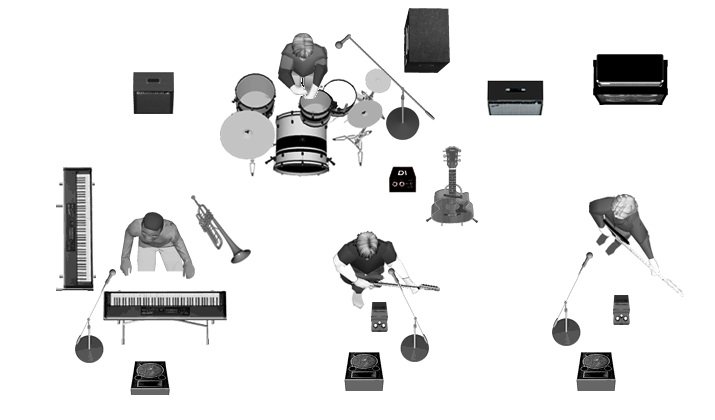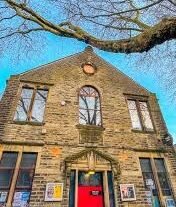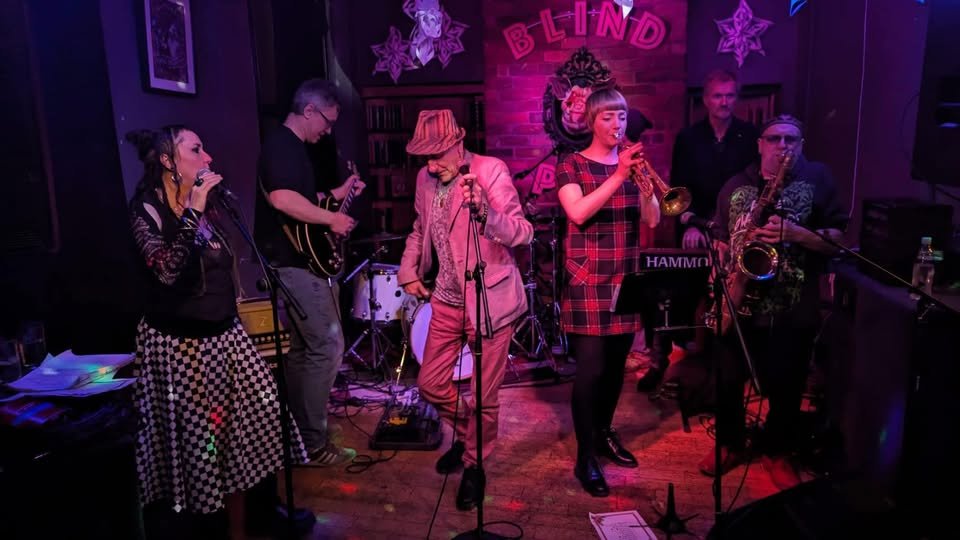This month's speaker was one of our own members, Dave Boardman with ‘Adventures in Stage Management - The role of those who make gigs happen’. He has been involved in this role for many years, and started by saying the job is ‘the best fun you can ever have’
The first task for the stage manager is to make sure that the stage is clear, and ready for all the equipment and the artists to work. He or she should be in control of all the things and, hopefully, people on the stage – multi tasking being a vital skill.
Health and safety for the crew, musicians, technicians and audience comes high, if not top, of the list of things to be considered. Away from the stage itself, the role involves liaison with the band (artists) and managers plus the people who will be bringing, and setting up the equipment required. A number of bands have their own stage crew to set up their instruments. During his talk, Dave showed a slide of a drum kit with a vital part – a piece of carpet beneath to stop the drums etc sliding away. The ‘bigger’ and more famous bands may also bring their own crew for setting up.
One of the most important things to get right is the sound system, as the audience expect to hear the artist properly. Dave said that the most well known artists would bring their own sound engineers to make the songs, as much as possible, sound like the albums on sale.
The stage manager also has to ensure that the performance runs to time, particularly when a number of groups or artists will be appearing. The role also has a form of ‘gatekeeper’; making sure that only the people allowed on the stage, will be on the stage. This is one of the hardest things to manage. He summed up the role by saying ‘If all the world’s a stage, the stage manager must be God’
Dave ran through his career up to becoming a stage manager, he left school in 1972 and had quite a few roles and positions, including structural engineering draughtsman, garage attendant, conveyor belt minder, a postman during one Christmas period, and an unemployment office queue attendant.
He took up journalism; writing for local press and for a time wrote reviews of albums and performances for the ‘Melody Maker’. Dave wrote a negative review of a performance by Elvis Costello (the majority of our audience seemed to recognise both the artist's name and the paper), which would be the last one he was asked to do.
His first foray into stage management was at Gullivers Nightclub in Liverpool, which closed long ago. At this time the club was being taken over by someone locally known as ‘Fat Harold’, the details of the takeover lost in time. The new owner wanted as many customers as possible, and some contraventions of licensing laws could have taken place – if someone said they were eighteen, and they looked eighteen, in they went.
Dave has been involved in stage management and other aspects of the musical industry for over half a century now, and in many parts of the country. He described a number of processes and checks to be made for the majority of them. These include safety for the audience, artists and crew. He would also have to think about any vehicles, sometimes big lorries with trailers; where the entrances and exits were, would they be in the right place at the right time for both the start and end of the show.

We saw a slide of instructions and timings which he had once used, and would refer to with one of the most important pieces of equipment – A4 sized paper on a clipboard. We also saw a diagram showing where each instrument and player would be on the stage, along with amplifiers and other technical equipment.
In 1999 Dave became involved with the Trades Club, which all of us had probably heard of. There he met Vince Robinson, who was the sound manager of the club, and now sadly deceased. Vince had once been on holiday in the Atlas Mountains in Africa. He spoke to some of the local people, and was surprised that some of them had heard of two things in Britain – London and the Hebden Bridge Trades Club. The club has a history of welcoming and enjoying African bands up to today.


Dave’s first role at the club was to introduce the bands and artists appearing, which he did for about ten years. One of the first of these were the ‘Outer Zeds’, formed in the 1980’s to support striking miners, and who recently celebrated their forty years together.
We heard about some slightly better known artists who have appeared at the club, including Wilko Johnson. Some of our audience might remember he was the guitarist from ‘Doctor Feelgood’; again recently deceased. At the time, that group had broken up and he performed with new musicians, and was said to be quite difficult to work with. The group said they would bring just their instruments, and would use the amplifiers that the club owned – as long as they weren’t ‘Marshall amps’. Their support group were more than pleased to be on the same bill as Wilko and, to improve their performance and perhaps make a good impression bought new amplifiers – Marshall Amps. Wilko and colleagues enjoyed the first set and, to avoid changing amplifiers and interrupting the show, made an exception and everyone went home happy.
Other well known, admittedly more famous in the past, have played at the club, including Kiki Dee – also known by Dave as ‘Pauline from Keighley’. Paul Young, an artist from the 1980’s, appeared with his ‘Tex Mexican’ band. Dave mentioned other artists from that period who had taken up a different style of music, and continue to entertain audiences today.
Dave was also involved in local outdoor events, including a number of festivals on the nearby Hebden Bridge (Calder Holmes) Park. These events were invariably very well attended, and demanded a great deal of planning. He said that one of the aims of these festivals was to attract artists from around the world, and particularly the African continent – in his words to ‘bring the world to Hebden Bridge’
Hebden Bridge summers invariably include heavy rain when it’s not wanted, and the park became too small for the number of people – over twenty five thousand on one year in an area the size of a football pitch. He described a couple of events about the difficulties and challenges of running the events. In one year there was rain from nearly every day from February onwards, which stopped the week after the event, and in another year the stage collapsed.
It was clearly unsafe to continue outdoors, and now the festival goes on in smaller venues in the area. A local group ‘The Outer Zeds’ may well appear for their 41st anniversary of being involved!
Many more memories and stories throughout Dave’s presentation, which was much appreciated by his fellow u3a members
.